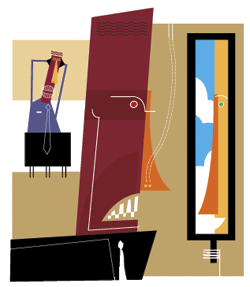BLIND SPOTS
Objects
in the mirror (yes, that means you)
aren’t always what they appear
to be
By
Bill Knoche
 |
Illustration by James Turner
|
A
SUPERSTAR RUNNER stumbles
at the finish line. A top-ranked Olympic
figure skater falls at the moment
of possible immortality. A popular
politician is touched by scandal just
when things seem like they can never
go wrong. A highly talented and gifted
businessperson is about to close the
deal of a lifetime—it’s
a go, but the deal is never completed.
It’s with a
sense of shock that we view these
events. We wonder what they were thinking.
What was really motivating them at
the moment of their downfall? What
was the fatal, tragic flaw? The media
immediately shift into overdrive and
trot out an impressive array of experts
and analysts to help us decipher the
underlining causes. But what about
us, the non-media darlings? Do we
subject ourselves to behaviour that
prevents us from reaching our highest
level of potential in business life?
Who are our own expert analysts who
will answer these questions in the
context of our careers? Who will be
the objective voice in our lives?
Part of my job as
a business coach is to guide people
along a path of inner understanding
to true awareness, to get them to
see what may be stopping them in their
journey to success. I do this knowing
that we all have blind spots. It’s
like driving a car with a defective
rear-view mirror. It’s only
after we change lanes and smack into
that unseen car that we become aware
of the blind spot.
In our personal lives,
blind spots are much more insidious.
Even after we crash a few times, we
still might not see why it is happening.
Have you ever known someone who repeatedly
moves from one dysfunctional relationship
to the next, and ultimately is dissatisfied?
This scenario speaks to the subtle,
yet pervasive, nature of our blind
spots.
The simple cause
for this starts with the human ego,
which solves complex problems and
invents elaborate strategies that
are meant to protect us. Unfortunately,
these same defence mechanisms can
become burdensome, hindering the development
of our personal and professional lives
without our being aware of it. We
can become resigned to being satisfied
with what we are used to, even when
there can be so much more. Identifying
our blind spots is crucial to understanding
what is truly going on inside us.
Only then can we balance our ego and
become aware of and “see”
our blind spots.
Many of our blind
spots are ingrained in us from past
experience. They represent a myriad
of events from our family lives, relationships,
educational experiences and socio-economic
status. The irony is that our blind
spots were once functional and, in
fact, helped us survive. This is what
makes them very difficult to perceive
and understand. Some experiences may
be so painful (or cyclical) that the
ego obligingly buries them deep in
the subconscious. That’s unfortunate
because if they are lodged in the
subconscious, it is the subconscious
that actually runs our lives.
Awareness of these
blind spots is an invaluable asset
in business dealings. It’s a
way of consistently checking over
our shoulder before we change lanes.
When we look at ourselves unflinchingly
in the mirror, an even greater reward
awaits. It may produce a whole new
world of possibilities and hidden
strengths. For example, the difference
between making a good deal and a great
deal could simply be in overcoming
an unconscious fear of authority figures.
In one-on-one situations
with executives and business owners,
a coach can work with clients on a
daily or even hourly basis, particularly
if there is a big deal at stake. An
effective coach must be willing to
shake hands with the devil: he must
engage with the executive’s
ego and be daring enough to challenge
and confront it head on. Alerting
clients to the devilish nature of
their blind spots is a rewarding experience
for both parties.
Some people believe
that friends and mentors can do the
job of a business coach. Perhaps,
but friends and mentors tend to say
what you want to hear, what you have
always heard. Your ego likes that.
It is comfortable with them or else
they wouldn’t be your friends
and mentors in the first place. These
people and other business professionals
are great when it comes to devising
specific business directions or strategies
and supporting whatever genius you
have already shown the world. However,
when it comes to having your full
powers at work in business and in
your personal life, objectivity is
essential. From there, you can begin
creating your own path to becoming
conscious of your blind spots. 
Bill
Knoche is president of Integra Enterprises,
a new-business-development
and coaching company based in Hamburg,
N.Y. He has been coaching
for the past 10 years in upstate New
York and Toronto.
|